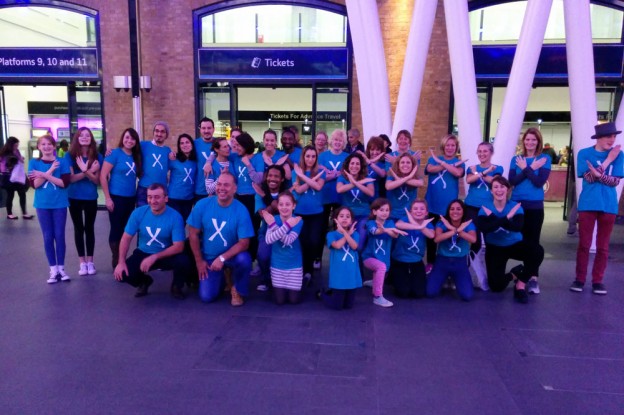This year the Fragile X Society organised a very special event to help to combat the lack of awareness of Fragile X Syndrome.
Around 35 volunteers, including families affected by Fragile X, descended upon King’s Cross Station in London to perform a specially-choreographed flash mob dance on a busy Friday evening.
Included in this group of volunteers was Becky Hardiman, a PhD student from the Tizard Centre at the University. Becky commented:
‘The event was such a positive way of raising awareness and so many people were asking questions about the condition. In my research I am focusing on Fragile X Syndrome, and I feel privileged to have been able to meet so many amazing families through this. At the beginning of my studies, I began volunteering with this fantastic charity and I am delighted that I will be starting work as Chief Executive part-time, alongside my PhD part-time, at the end of the month. The Tizard Centre have been very supportive in allowing me to develop my involvement and I look forward to helping to disseminate the Centre’s fantastic work to families.’
The flash mob was part of a wider awareness raising day on 10 October organised by the European Network of Fragile X Organisations.
You can also look on Twitter to see the #fragileXtraordinary campaign, which aimed to celebrate a group of amazing people who happen to have fragile X syndrome, and the ways that they face the challenges that may be associated with the condition. Hundreds of photos and stories were shared, with the hashtag reaching over half a million people.
What is Fragile X Syndrome?
‘Fragile X Syndrome? I’ve never heard of it!’ That is the response most of the fragile X community get when discussing their loved one’s disability, with public and professionals alike.
However, 1 in 4000 males and 1 in 8000 females have Fragile X Syndrome, which the most common inherited cause of learning disability and the most common known single gene cause of autism.
In addition to learning deficits, individuals with fragile X may have language delay, ADHD, clinical anxiety and in some cases epilepsy.
Surprisingly, 1 in 200 females and 1 in 400 males in the general population are carriers of the gene, meaning that future generations might have fragile X.
Carriers themselves may also experience problems with anxiety, early menopause, tremors and ataxia.
Receiving a diagnosis can be a life changing experience, particularly as fragile X is an inherited condition, meaning multiple members of the same family may be affected. Early diagnosis makes a huge difference but is not easy to come by as no one’s heard of it!
